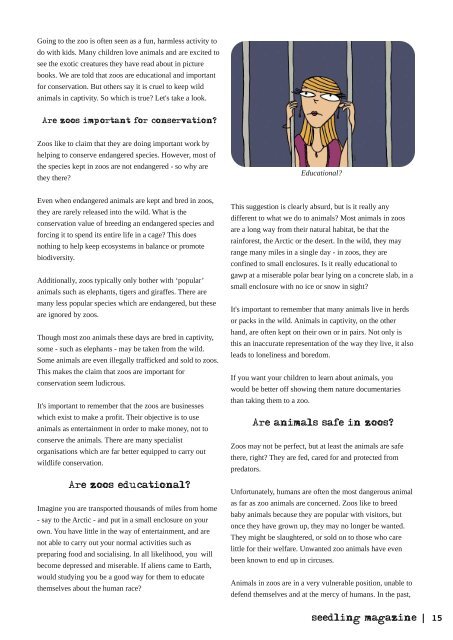Seedling Magazine
Seedling is a new digital magazine aimed at making the world a better place. Read about sustainability, spirituality, nature, personal growth and more - all from a vegan perspective!
Seedling is a new digital magazine aimed at making the world a better place. Read about sustainability, spirituality, nature, personal growth and more - all from a vegan perspective!
You also want an ePaper? Increase the reach of your titles
YUMPU automatically turns print PDFs into web optimized ePapers that Google loves.
Going to the zoo is often seen as a fun, harmless activity to<br />
do with kids. Many children love animals and are excited to<br />
see the exotic creatures they have read about in picture<br />
books. We are told that zoos are educational and important<br />
for conservation. But others say it is cruel to keep wild<br />
animals in captivity. So which is true? Let's take a look.<br />
Are zoos important for conservation?<br />
Zoos like to claim that they are doing important work by<br />
helping to conserve endangered species. However, most of<br />
the species kept in zoos are not endangered so why are<br />
they there?<br />
Educational?<br />
Even when endangered animals are kept and bred in zoos,<br />
they are rarely released into the wild. What is the<br />
conservation value of breeding an endangered species and<br />
forcing it to spend its entire life in a cage? This does<br />
nothing to help keep ecosystems in balance or promote<br />
biodiversity.<br />
Additionally, zoos typically only bother with ‘popular’<br />
animals such as elephants, tigers and giraffes. There are<br />
many less popular species which are endangered, but these<br />
are ignored by zoos.<br />
Though most zoo animals these days are bred in captivity,<br />
some such as elephants may be taken from the wild.<br />
Some animals are even illegally trafficked and sold to zoos.<br />
This makes the claim that zoos are important for<br />
conservation seem ludicrous.<br />
It's important to remember that the zoos are businesses<br />
which exist to make a profit. Their objective is to use<br />
animals as entertainment in order to make money, not to<br />
conserve the animals. There are many specialist<br />
organisations which are far better equipped to carry out<br />
wildlife conservation.<br />
Are zoos educational?<br />
Imagine you are transported thousands of miles from home<br />
say to the Arctic and put in a small enclosure on your<br />
own. You have little in the way of entertainment, and are<br />
not able to carry out your normal activities such as<br />
preparing food and socialising. In all likelihood, you will<br />
become depressed and miserable. If aliens came to Earth,<br />
would studying you be a good way for them to educate<br />
themselves about the human race?<br />
This suggestion is clearly absurd, but is it really any<br />
different to what we do to animals? Most animals in zoos<br />
are a long way from their natural habitat, be that the<br />
rainforest, the Arctic or the desert. In the wild, they may<br />
range many miles in a single day in zoos, they are<br />
confined to small enclosures. Is it really educational to<br />
gawp at a miserable polar bear lying on a concrete slab, in a<br />
small enclosure with no ice or snow in sight?<br />
It's important to remember that many animals live in herds<br />
or packs in the wild. Animals in captivity, on the other<br />
hand, are often kept on their own or in pairs. Not only is<br />
this an inaccurate representation of the way they live, it also<br />
leads to loneliness and boredom.<br />
If you want your children to learn about animals, you<br />
would be better off showing them nature documentaries<br />
than taking them to a zoo.<br />
Are animals safe in zoos?<br />
Zoos may not be perfect, but at least the animals are safe<br />
there, right? They are fed, cared for and protected from<br />
predators.<br />
Unfortunately, humans are often the most dangerous animal<br />
as far as zoo animals are concerned. Zoos like to breed<br />
baby animals because they are popular with visitors, but<br />
once they have grown up, they may no longer be wanted.<br />
They might be slaughtered, or sold on to those who care<br />
little for their welfare. Unwanted zoo animals have even<br />
been known to end up in circuses.<br />
Animals in zoos are in a very vulnerable position, unable to<br />
defend themselves and at the mercy of humans. In the past,<br />
seedling magazine | 15





